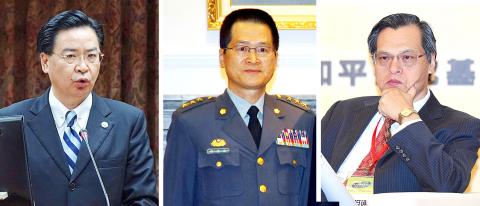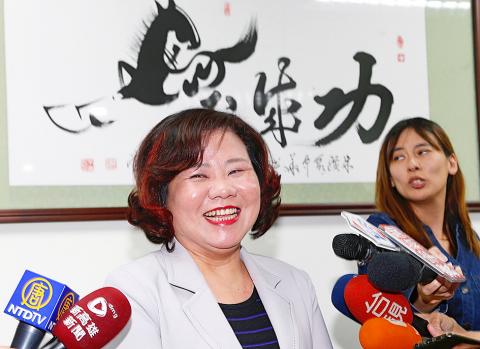President Tsai Ing-wen’s (蔡英文) administration yesterday announced a reshuffle of its top national security, foreign affairs and cross-strait officials.
Presidential Office Secretary-General Joseph Wu (吳釗燮) is to replace Minister of Foreign Affairs David Lee (李大維), who is to fill a vacancy left by National Security Council Secretary-General Yan Te-fa (嚴德發) after Yan becomes the minister of national defense.
Mainland Affairs Council (MAC) Minister Katharine Chang (張小月) is to be replaced by Chen Min-tong (陳明通), a professor at National Taiwan University’s Graduate Institute of National Development who headed the council from 2007 to 2008.

Photos: Taipei Times and CNA
Due to health issues, Minister of Labor Lin Mei-chu (林美珠) is to leave her post and be succeeded by Kaohsiung Deputy Mayor Hsu Ming-chun (許銘春), while former chief of the general staff Chiu Kuo-cheng (邱國正) is to take over the Veterans Affairs Council after Director Lee Shying-jow (李翔宙) departs.
Chang, Lee Shying-jow and Minister of National Defense Feng Shih-kuan (馮世寬) are to be appointed to new posts, Executive Yuan spokesman Hsu Kuo-yung (徐國勇) said, without providing further details.
However, media reports said that Feng is to assume the presidency of a government-funded national security think tank, which is expected to become operational in May.

Photo: CNA
The personnel changes are scheduled to take effect on Monday, with the exception of Chen, who has to handle school matters first and would not report for duty until the middle of next month, Hsu Kuo-yung said
MAC Deputy Minister Lin Cheng-yi (林正義) is to step in for Chen in the meantime, he added.
Regarding Wu’s successor, Presidential Office spokesman Alex Huang (黃重諺) downplayed speculation that it would be Kaohsiung Mayor Chen Chu (陳菊), saying only that the matter has yet to be determined and would be announced as soon as a decision is made.
Given that the reshuffle mostly pertained to the president’s mandates on foreign affairs, national defense and cross-strait ties, the lineup was not finalized until a meeting between Tsai and Premier William Lai (賴清德) at 1:30pm yesterday, Huang said.
As some ministers who would reportedly be replaced were not included in the reorganization, such as Minister of Education Pan Wen-chung (潘文忠) and Minister of the Interior Yeh Jiunn-rong (葉俊榮), there was speculation in the media over whether another reshuffle could occur after May 20, the second anniversary of Tsai’s inauguration.
There were no leadership changes in government agencies overseen by Lai — other than Lin Mei-chu — because of good teamwork between the premier and those Cabinet members, Hsu Kuo-yung said.
“The premier also felt that his team’s momentum has not only not slackened since he assumed the premiership on Sept. 8 last year, but has continued in an upward direction,” Hsu Kuo-yung said, adding that any speculation of a reshuffle was unfair to the hardworking ministers.
Nevertheless, he declined to personally guarantee the other ministers’ jobs would be safe when asked, saying that politically appointed officials should always be prepared to leave.
In response to a reporter’s question on whether Wu’s appointment as foreign minister constituted a demotion, he said that Wu’s current and future posts are all minister-level positions.
Wu, a long-time trusted aide of Tsai on international and security affairs, served as the nation’s representative to the US, as well as Democratic Progressive Party secretary-general under Tsai’s party leadership from May 2014 to May 2016, when she campaigned for the presidency.
Following Tsai’s inauguration as president, Wu was put in charge of the top national security body before being transferred to his current post in May last year.

DAREDEVIL: Honnold said it had always been a dream of his to climb Taipei 101, while a Netflix producer said the skyscraper was ‘a real icon of this country’ US climber Alex Honnold yesterday took on Taiwan’s tallest building, becoming the first person to scale Taipei 101 without a rope, harness or safety net. Hundreds of spectators gathered at the base of the 101-story skyscraper to watch Honnold, 40, embark on his daredevil feat, which was also broadcast live on Netflix. Dressed in a red T-shirt and yellow custom-made climbing shoes, Honnold swiftly moved up the southeast face of the glass and steel building. At one point, he stepped onto a platform midway up to wave down at fans and onlookers who were taking photos. People watching from inside

A Vietnamese migrant worker yesterday won NT$12 million (US$379,627) on a Lunar New Year scratch card in Kaohsiung as part of Taiwan Lottery Co’s (台灣彩券) “NT$12 Million Grand Fortune” (1200萬大吉利) game. The man was the first top-prize winner of the new game launched on Jan. 6 to mark the Lunar New Year. Three Vietnamese migrant workers visited a Taiwan Lottery shop on Xinyue Street in Kaohsiung’s Gangshan District (崗山), a store representative said. The player bought multiple tickets and, after winning nothing, held the final lottery ticket in one hand and rubbed the store’s statue of the Maitreya Buddha’s belly with the other,

‘NATO-PLUS’: ‘Our strategic partners in the Indo-Pacific are facing increasing aggression by the Chinese Communist Party,’ US Representative Rob Wittman said The US House of Representatives on Monday released its version of the Consolidated Appropriations Act, which includes US$1.15 billion to support security cooperation with Taiwan. The omnibus act, covering US$1.2 trillion of spending, allocates US$1 billion for the Taiwan Security Cooperation Initiative, as well as US$150 million for the replacement of defense articles and reimbursement of defense services provided to Taiwan. The fund allocations were based on the US National Defense Authorization Act for fiscal 2026 that was passed by the US Congress last month and authorized up to US$1 billion to the US Defense Security Cooperation Agency in support of the

‘COMMITTED TO DETERRENCE’: Washington would stand by its allies, but it can only help as much as countries help themselves, Raymond Greene said The US is committed to deterrence in the first island chain, but it should not bear the burden alone, as “freedom is not free,” American Institute in Taiwan Director Raymond Greene said in a speech at the Institute for National Defense and Security Research’s “Strengthening Resilience: Defense as the Engine of Development” seminar in Taipei yesterday. In the speech, titled “Investing Together and a Secure and Prosperous Future,” Greene highlighted the contributions of US President Donald Trump’s administration to Taiwan’s defense efforts, including the establishment of supply chains for drones and autonomous systems, offers of security assistance and the expansion of